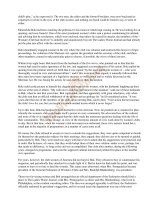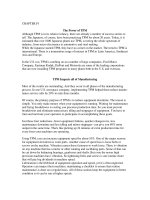Tài liệu The Americanization of Edward Bok 6 pdf
Bạn đang xem bản rút gọn của tài liệu. Xem và tải ngay bản đầy đủ của tài liệu tại đây (168.16 KB, 10 trang )
Stockton was busy writing, but at this bit of hopeful news he looked up, his eyes kindled, he dropped his pen,
and eagerly said:
"Tell me."
And looking behind him to see that the way was clear, Frost answered:
"Pave it solid, old man."
When the stories of Dr. Jekyll and Mr. Hyde and Little Lord Fauntleroy were made into plays, Bok was given
an opportunity for an entirely different kind of publicity. Both plays were highly successful; they ran for
weeks in succession, and each evening Bok had circulars of the books in every seat of the theatre; he had a
table filled with the books in the foyer of each theatre; and he bombarded the newspapers with stories of Mr.
Mansfield's method of making the quick change from one character to the other in the dual role of the
Stevenson play, and with anecdotes about the boy Tommy Russell in Mrs. Burnett's play. The sale of the
books went merrily on, and kept pace with the success of the plays. And it all sharpened the initiative of the
young advertiser and developed his sense for publicity.
One day while waiting in the anteroom of a publishing house to see a member of the firm, he picked up a
book and began to read it. Since he had to wait for nearly an hour, he had read a large part of the volume when
he was at last admitted to the private office. When his business was finished, Bok asked the publisher why this
book was not selling.
"I don't know," replied the publisher. "We had great hopes for it, but somehow or other the public has not
responded to it."
"Are you sure you are telling the public about it in the right way?" ventured Bok.
The Scribner advertising had by this time attracted the attention of the publishing world, and this publisher
was entirely ready to listen to a suggestion from his youthful caller.
"I wish we published it," said Bok. "I think I could make it a go. It's all in the book."
"How would you advertise it?" asked the publisher.
Bok promised the publisher he would let him know. He carried with him a copy of the book, wrote some
advertisements for it, prepared an attractive "broadside" of extracts, to which the book easily lent itself, wrote
some literary notes about it, and sent the whole collection to the publisher. Every particle of "copy" which
Bok had prepared was used, the book began to sell, and within three months it was the most discussed book of
the day.
The book was Edward Bellamy's "Looking Backward".
XI. The Chances for Success
Edward Bok does not now remember whether the mental picture had been given him, or whether he had
conjured it up for himself; but he certainly was possessed of the idea, as are so many young men entering
business, that the path which led to success was very difficult: that it was overfilled with a jostling, bustling,
panting crowd, each eager to reach the goal; and all ready to dispute every step that a young man should take;
and that favoritism only could bring one to the top.
The Legal Small Print 56
After Bok had been in the world of affairs, he wondered where were these choked avenues, these struggling
masses, these competitors for every inch of vantage. Then he gradually discovered that they did not exist.
In the first place, he found every avenue leading to success wide open and certainly not over-peopled. He was
surprised how few there were who really stood in a young man's way. He found that favoritism was not the
factor that he had been led to suppose. He realized it existed in a few isolated cases, but to these every one had
pointed and about these every one had talked until, in the public mind, they had multiplied in number and
assumed a proportion that the facts did not bear out.
Here and there a relative "played a favorite," but even with the push and influence behind him "the lucky
one," as he was termed, did not seem to make progress, unless he had merit. It was not long before Bok
discovered that the possession of sheer merit was the only real factor that actually counted in any of the places
where he had been employed or in others which he had watched; that business was so constructed and
conducted that nothing else, in the face of competition, could act as current coin. And the amazing part of it
all to Bok was how little merit there was. Nothing astonished him more than the low average ability of those
with whom he worked or came into contact.
He looked at the top, and instead of finding it overcrowded, he was surprised at the few who had reached
there; the top fairly begged for more to climb its heights.
For every young man, earnest, eager to serve, willing to do more than he was paid for, he found ten trying to
solve the problem of how little they could actually do for the pay received.
It interested Bok to listen to the talk of his fellow-workers during luncheon hours and at all other times outside
of office hours. When the talk did turn on the business with which they were concerned, it consisted almost
entirely of wages, and he soon found that, with scarcely an exception, every young man was terribly
underpaid, and that his employer absolutely failed to appreciate his work. It was interesting, later, when Bok
happened to get the angle of the employer, to discover that, invariably, these same lamenting young men were
those who, from the employer's point of view, were either greatly overpaid or so entirely worthless as to be
marked for early decapitation.
Bok felt that this constant thought of the wages earned or deserved was putting the cart before the horse; he
had schooled himself into the belief that if he did his work well, and accomplished more than was expected of
him, the question of wages would take care of itself. But, according to the talk on every side, it was he who
had the cart before the horse. Bok had not only tried always to fill the particular job set for him but had made
it a rule at the same time to study the position just ahead, to see what it was like, what it demanded, and then,
as the opportunity presented itself, do a part of that job in addition to his own. As a stenographer, he tried
always to clear off the day's work before he closed his desk. This was not always possible, but he kept it
before him as a rule to be followed rather than violated.
One morning Bok's employer happened to come to the office earlier than usual, to find the letters he had
dictated late in the afternoon before lying on his desk ready to be signed.
"These are the letters I gave you late yesterday afternoon, are they not?" asked the employer.
"Yes, sir."
"Must have started early this morning, didn't you?"
"No, sir," answered Bok. "I wrote them out last evening before I left."
"Like to get your notes written out before they get stale?"
The Legal Small Print 57
"Yes, sir."
"Good idea," said the employer.
"Yes, sir," answered Bok, "and I think it is even a better idea to get a day's work off before I take my apron
off."
"Well said," answered the employer, and the following payday Bok found an increase in his weekly envelope.
It is only fair, however, to add here, parenthetically, that it is neither just nor considerate to a conscientious
stenographer for an employer to delay his dictation until the end of the day's work, when, merely by judicious
management of his affairs and time, he can give his dictation directly after opening his morning mail. There
are two sides to every question; but sometimes the side of the stenographer is not kept in mind by the
employer.
Bok found it a uniform rule among his fellow-workers to do exactly the opposite to his own idea; there was an
astonishing unanimity in working by the clock; where the hour of closing was five o'clock the preparations
began five minutes before, with the hat and overcoat over the back of the chair ready for the stroke of the
hour. This concert of action was curiously universal, no "overtime" was ever to be thought of, and, as
occasionally happened when the work did go over the hour, it was not, to use the mildest term, done with care,
neatness, or accuracy; it was, to use a current phrase, "slammed off." Every moment beyond five o'clock in
which the worker was asked to do anything was by just so much an imposition on the part of the employer,
and so far as it could be safely shown, this impression was gotten over to him.
There was an entire unwillingness to let business interfere with any anticipated pleasure or personal
engagement. The office was all right between nine and five; one had to be there to earn a living; but after five,
it was not to be thought of for one moment. The elevators which ran on the stroke of five were never large
enough to hold the throng which besieged them.
The talk during lunch hour rarely, if ever, turned toward business, except as said before, when it dealt with
underpaid services. In the spring and summer it was invariably of baseball, and scores of young men knew the
batting averages of the different players and the standing of the clubs with far greater accuracy than they knew
the standing or the discounts of the customers of their employers. In the winter the talk was all of dancing,
boxing, or plays.
It soon became evident to Bok why scarcely five out of every hundred of the young men whom he knew made
any business progress. They were not interested; it was a case of a day's work and a day's pay; it was not a
question of how much one could do but how little one could get away with. The thought of how well one
might do a given thing never seemed to occur to the average mind.
"Oh, what do you care?" was the favorite expression. "The boss won't notice it if you break your back over his
work; you won't get any more pay."
And there the subject was dismissed, and thoroughly dismissed, too.
Eventually, then, Bok learned that the path that led to success was wide open: the competition was negligible.
There was no jostling. In fact, travel on it was just a trifle lonely. One's fellow-travellers were excellent
company, but they were few! It was one of Edward Bok's greatest surprises, but it was also one of his greatest
stimulants. To go where others could not go, or were loath to go, where at least they were not, had a tang that
savored of the freshest kind of adventure. And the way was so simple, so much simpler, in fact, than its
avoidance, which called for so much argument, explanation, and discussion. One had merely to do all that one
could do, a little more than one was asked or expected to do, and immediately one's head rose above the
The Legal Small Print 58
crowd and one was in an employer's eye where it is always so satisfying for an employee to be! And as so
few heads lifted themselves above the many, there was never any danger that they would not be seen.
Of course, Edward Bok had to prove to himself that his conception of conditions was right. He felt
instinctively that it was, however, and with this stimulus he bucked the line hard. When others played, he
worked, fully convinced that his play-time would come later. Where others shirked, he assumed. Where others
lagged, he accelerated his pace. Where others were indifferent to things around them, he observed and put
away the results for possible use later. He did not make of himself a pack-horse; what he undertook he did
from interest in it, and that made it a pleasure to him when to others it was a burden. He instinctively reasoned
it out that an unpleasant task is never accomplished by stepping aside from it, but that, unerringly, it will
return later to be met and done.
Obstacles, to Edward Bok, soon became merely difficulties to be overcome, and he trusted to his instinct to
show him the best way to overcome them. He soon learned that the hardest kind of work was back of every
success; that nothing in the world of business just happened, but that everything was brought about, and only
in one way by a willingness of spirit and a determination to carry through. He soon exploded for himself the
misleading and comfortable theory of luck: the only lucky people, he found, were those who worked hard. To
them, luck came in the shape of what they had earned. There were exceptions here and there, as there are to
every rule; but the majority of these, he soon found, were more in the seeming than in the reality. Generally
speaking and of course to this rule there are likewise exceptions, or as the Frenchman said, "All
generalizations are false, including this one" a man got in this world about what he worked for.
And that became, for himself, the rule of Edward Bok's life.
XII. Baptism Under Fire
The personnel of the Scribner house was very youthful from the members of the firm clear down the line. It
was veritably a house of young men.
The story is told of a Boston publisher, sedate and fairly elderly, who came to the Scribner house to transact
business with several of its departments. One of his errands concerning itself with advertising, he was
introduced to Bok, who was then twenty-four. Looking the youth over, he transacted his business as well as he
felt it could be transacted with a manager of such tender years, and then sought the head of the educational
department: this brought him to another young man of twenty-four.
With his yearnings for some one more advanced in years full upon him, the visitor now inquired for the
business manager of the new magazine, only to find a man of twenty-six. His next introduction was to the
head of the out-of-town business department, who was twenty-seven.
At this point the Boston man asked to see Mr. Scribner. This disclosed to him Mr. Arthur H. Scribner, the
junior partner, who owned to twenty-eight summers. Mustering courage to ask faintly for Mr. Charles
Scribner himself, he finally brought up in that gentleman's office only to meet a man just turning thirty-three!
"This is a young-looking crowd," said Mr. Scribner one day, looking over his young men. And his eye rested
on Bok. "Particularly you, Bok. Doubleday looks his years better than you do, for at least he has a
moustache." Then, contemplatively: "You raise a moustache, Bok, and I'll raise your salary."
This appealed to Bok very strongly, and within a month he pointed out the result to his employer. "Stand in
the light here," said Mr. Scribner. "Well, yes," he concluded dubiously, "it's there something at least. All
right; I'll keep my part of the bargain."
The Legal Small Print 59
He did. But the next day he was nonplussed to see that the moustache had disappeared from the lip of his
youthful advertising manager. "Couldn't quite stand it, Mr. Scribner," was the explanation. "Besides, you
didn't say I should keep it: you merely said to raise it."
But the increase did not follow the moustache. To Bok's great relief, it stuck!
This youthful personnel, while it made for esprit de corps, had also its disadvantages. One day as Bok was
going out to lunch, he found a small-statured man, rather plainly dressed, wandering around the retail
department, hoping for a salesman to wait on him. The young salesman on duty, full of inexperience, had a
ready smile and quick service ever ready for "carriage trade," as he called it; but this particular customer had
come afoot, and this, together with his plainness of dress, did not impress the young salesman. His attention
was called to the wandering customer, and it was suggested that he find out what was wanted. When Bok
returned from lunch, the young salesman, who, with a beaming smile, had just most ceremoniously bowed the
plainly dressed little customer out of the street-door, said: "You certainly struck it rich that time when you
suggested my waiting on that little man! Such an order! Been here ever since. Did you know who it was?"
"No," returned Bok. "Who was it?"
"Andrew Carnegie," beamed the salesman.
Another youthful clerk in the Scribner retail bookstore, unconscious of the customer's identity, waited one day
on the wife of Mark Twain.
Mrs. Clemens asked the young salesman for a copy of Taine's Ancient Regime.
"Beg pardon," said the clerk, "what book did you say?"
Mrs. Clemens repeated the author and title of the book.
Going to the rear of the store, the clerk soon returned, only to inquire: "May I ask you to repeat the name of
the author?"
"Taine, T-a-i-n-e," replied Mrs. Clemens.
Then did the youthfulness of the salesman assert itself. Assuming an air of superior knowledge, and looking at
the customer with an air of sympathy, he corrected Mrs. Clemens:
"Pardon me, madam, but you have the name a trifle wrong. You mean Twain-not Taine."
With so many young men of the same age, there was a natural sense of team-work and a spirit of comradeship
that made for successful co-operation. This spirit extended outside of business hours. At luncheon there was a
Scribner table in a neighboring restaurant, and evenings saw the Scribner department heads mingling as
friends. It was a group of young men who understood and liked each other, with the natural result that
business went easier and better because of it.
But Bok did not have much time for evening enjoyment, since his outside interests had grown and prospered
and they kept him busy. His syndicate was regularly supplying over a hundred newspapers: his literary letter
had become an established feature in thirty different newspapers.
Of course, his opportunities for making this letter interesting were unusual. Owing to his Scribner connection,
however, he had taken his name from the letter and signed that of his brother. He had, also, constantly to
discriminate between the information that he could publish without violation of confidence and that which he
The Legal Small Print 60
felt he was not at liberty to print. This gave him excellent experience; for the most vital of all essentials in the
journalist is the ability unerringly to decide what to print and what to regard as confidential.
Of course, the best things that came to him he could not print. Whenever there was a question, he gave the
benefit of the doubt to the confidential relation in which his position placed him with authors; and his Dutch
caution, although it deprived him of many a toothsome morsel for his letter, soon became known to his
confreres, and was a large asset when, as an editor, he had to follow the golden rule of editorship that teaches
one to keep the ears open but the mouth shut.
This Alpha and Omega of all the commandments in the editorial creed some editors learn by sorrowful
experience. Bok was, again, fortunate in learning it under the most friendly auspices. He continued to work
without sparing himself, but his star remained in the ascendency. Just how far a man's own efforts and
standards keep a friendly star centred over his head is a question. But Edward Bok has always felt that he was
materially helped by fortuitous conditions not of his own creation or choice.
He was now to receive his first public baptism of fire. He had published a symposium, through his newspaper
syndicate, discussing the question, "Should Clergymen Smoke?" He had induced all the prominent clergymen
in the country to contribute their views, and so distinguished was the list that the article created widespread
attention.
One of the contributors was the Reverend Richard S. Storrs, D.D., one of the most distinguished of Brooklyn's
coterie of clergy of that day. A few days after the publication of the article, Bok was astounded to read in the
Brooklyn Eagle a sensational article, with large headlines, in which Doctor Storrs repudiated his contribution
to the symposium, declared that he had never written or signed such a statement, and accused Edward Bok of
forgery.
Coming from a man of Doctor Storrs's prominence, the accusation was, of course, a serious one. Bok realized
this at once. He foresaw the damage it might work to the reputation of a young man trying to climb the ladder
of success, and wondered why Doctor Storrs had seen fit to accuse him in this public manner instead of
calling upon him for a personal explanation. He thought perhaps he might find such a letter from Doctor
Storrs when he reached home, but instead he met a small corps of reporters from the Brooklyn and New York
newspapers. He told them frankly that no one was more surprised at the accusation than he, but that the
original contributions were in the New York office of the syndicate, and he could not corroborate his word
until he had looked into the papers and found Doctor Storrs's contribution.
That evening Bok got at the papers in the case, and found out that, technically, Doctor Storrs was right: he had
not written or signed such a statement. The compiler of the symposium, the editor of one of New York's
leading evening papers whom Bok had employed, had found Doctor Storrs's declaration in favor of a
clergyman's use of tobacco in an address made some time before, had extracted it and incorporated it into the
symposium. It was, therefore, Doctor Storrs's opinion on the subject, but not written for the occasion for
which it was used. Bok felt that his editor had led him into an indiscretion. Yet the sentiments were those of
the writer whose name was attached to them, so that the act was not one of forgery. The editor explained that
he had sent the extract to Doctor Storrs, who had not returned it, and he had taken silence to mean consent to
the use of the material.
Bok decided to say nothing until he heard from Doctor Storrs personally, and so told the newspapers. But the
clergyman did not stop his attack. Of course, the newspapers egged him on and extracted from him the further
accusation that Bok's silence proved his guilt. Bok now took the case to Mr. Beecher, and asked his advice.
"Well, Edward, you are right and you are wrong," said Mr. Beecher. "And so is Storrs, of course. It is beneath
him to do what he has done. Storrs and I are not good friends, as you know, and so I cannot go to him and ask
him the reason of his disclaimer. Otherwise I would. Of course, he may have forgotten his remarks: that is
The Legal Small Print 61
always possible in a busy man's life. He may not have received the letter enclosing them. That is likewise
possible. But I have a feeling that Storrs has some reason for wishing to repudiate his views on this subject
just at this time. What it is I do not, of course, know, but his vehemence makes me think so. I think I should
let him have his rein. Keep you quiet. It may damage you a little here and there, but in the end it won't harm
you. In the main point, you are right. You are not a forger. The sentiments are his and he uttered them, and he
should stand by them. He threatens to bring you into court, I see from to-day's paper. Wait until he does so."
Bok, chancing to meet Doctor Talmage, told him Mr. Beecher's advice, and he endorsed it. "Remember, boy,"
said Doctor Talmage, "silence is never so golden as when you are under fire. I know, for I have been there, as
you know, more than once. Keep quiet; and always believe this: that there is a great deal of common sense
abroad in the world, and a man is always safe in trusting it to do him justice."
They were not pleasant and easy days for Bok, for Doctor Storrs kept up the din for several days. Bok waited
for the word to appear in court. But this never came, and the matter soon died down and out. And, although
Bok met the clergyman several times afterward in the years that followed, no reference was ever made by him
to the incident.
But Edward Bok had learned a valuable lesson of silence under fire an experience that was to stand him in
good stead when he was again publicly attacked not long afterward.
This occurred in connection with a notable anniversary celebration in honor of Henry Ward Beecher, in which
the entire city of Brooklyn was to participate. It was to mark a mile-stone in Mr. Beecher's ministry and in his
pastorate of Plymouth Church. Bok planned a worldwide tribute to the famed clergyman: he would get the
most distinguished men and women of this and other countries to express their esteem for the Plymouth pastor
in written congratulations, and he would bind these into a volume for presentation to Mr. Beecher on the
occasion. He consulted members of the Beecher family, and, with their acquiescence, began to assemble the
material. He was in the midst of the work when Henry Ward Beecher passed away. Bok felt that the tributes
already received were too wonderful to be lost to the world, and, after again consulting Mrs. Beecher and her
children, he determined to finish the collection and publish it as a memorial for private distribution. After a
prodigious correspondence, the work was at last completed; and in June, 1887, the volume was published, in a
limited edition of five hundred copies. Bok distributed copies of the volume to the members of Mr. Beecher's
family, he had orders from Mr. Beecher's friends, one hundred copies were offered to the American public
and one hundred copies were issued in an English edition.
With such a figure to whom to do honor, the contributors, of course, included the foremost men and women of
the time. Grover Cleveland was then President of the United States, and his tribute was a notable one. Mr.
Gladstone, the Duke of Argyll, Pasteur, Canon Farrar, Bartholdi, Salvini, and a score of others represented
English and European opinion. Oliver Wendell Holmes, John Greenleaf Whittier, T. De Witt Talmage, Robert
G. Ingersoll, Charles Dudley Warner, General Sherman, Julia Ward Howe, Andrew Carnegie, Edwin Booth,
Rutherford B. Hayes there was scarcely a leader of thought and of action of that day unrepresented. The
edition was, of course, quickly exhausted; and when to-day a copy occasionally appears at an auction sale, it
is sold at a high price.
The newspapers gave very large space to the distinguished memorial, and this fact angered a journalist, Joseph
Howard, Junior, a man at one time close to Mr. Beecher, who had befriended him. Howard had planned to be
the first in the field with a hastily prepared biography of the great preacher, and he felt that Bok had
forestalled him. Forthwith, he launched a vicious attack on the compiler of the memorial, accusing him of
"making money out of Henry Ward Beecher's dead body" and of "seriously offending the family of Mr.
Beecher, who had had no say in the memorial, which was therefore without authority, and hence extremely
distasteful to all."
Howard had convinced a number of editors of the justice of his position, and so he secured a wide publication
The Legal Small Print 62
for his attack. For the second time, Edward Bok was under fire, and remembering his action on the previous
occasion, he again remained silent, and again the argument was put forth that his silence implied guilt. But
Mrs. Beecher and members of the Beecher family did not observe silence, and quickly proved that not only
had Bok compiled the memorial as a labor of love and had lost money on it, but that he had the full consent of
the family in its preparation.
When, shortly afterward, Howard's hastily compiled "biography" of Mr. Beecher appeared, a reporter asked
Mrs. Beecher whether she and her family had found it accurate.
"Accurate, my child," said Mrs. Beecher. "Why, it is so accurate in its absolute falsity that neither I nor the
boys can find one fact or date given correctly, although we have studied it for two days. Even the year of Mr.
Beecher's birth is wrong, and that is the smallest error!"
Edward Bok little dreamed that these two experiences with public criticism were to serve him as a foretaste of
future attacks when he would get the benefit of hundreds of pencils especially sharpened for him.
XIII. Publishing Incidents and Anecdotes
One evening some literary men were dining together previous to going to a private house where a number of
authors were to give readings from their books. At the table the talk turned on the carelessness with which the
public reads books. Richard Harding Davis, one of the party, contended that the public read more carefully
than the others believed. It was just at the time when Du Maurier's Trilby was in every one's hands.
"Don't you believe it," said one of the diners. "I'll warrant you could take a portion of some well-known story
to-night and palm it off on most of your listeners as new stuff."
"Done," said Davis. "Come along, and I'll prove you wrong."
The reading was to be at the house of John Kendrick Bangs at Yonkers. When Davis's "turn" in the
programme came, he announced that he would read a portion from an unpublished story written by himself.
Immediately there was a flutter in the audience, particularly among the younger element.
Pulling a roll of manuscript out of his pocket, Davis began:
"It was a fine, sunny, showery day in April. The big studio window "
He got no farther. Almost the entire audience broke into a shout of laughter and applause. Davis had read
thirteen of the opening words of Trilby.
All publishing houses employ "readers" outside of those in their own offices for the reading of manuscripts on
special subjects. One of these "outside readers" was given a manuscript for criticism. He took it home and
began its reading. He had finished only a hundred pages or so when, by a curious coincidence, the card of the
author of the manuscript was brought to the "reader." The men were close friends.
Hastily gathering up the manuscript, the critic shoved the work into a drawer of his desk, and asked that his
friend be shown in.
The evening was passed in conversation; as the visitor rose to leave, his host, rising also and seating himself
on his desk, asked:
"What have you been doing lately? Haven't seen much of you."
The Legal Small Print 63
"No," said the friend. "It may interest you to know that I have been turning to literary work, and have just
completed what I consider to be an important book."
"Really?" commented the "reader."
"Yes," went on his friend. "I submitted it a few days ago to one of the big publishing houses. But, great Scott,
you can never tell what these publishers will do with a thing of that sort. They give their manuscripts to all
kinds of fools to read. I suppose, by this time, some idiot, who doesn't know a thing of the subject about which
I have written, is sitting on my manuscript."
Mechanically, the "reader" looked at the desk upon which he was sitting, thought of the manuscript lying in
the drawer directly under him, and said:
"Yes, that may be. Quite likely, in fact."
Of no novel was the secret of the authorship ever so well kept as was that of The Breadwinners, which,
published anonymously in 1883, was the talk of literary circles for a long time, and speculation as to its
authorship was renewed in the newspapers for years afterward. Bok wanted very much to find out the author's
name so that he could announce it in his literary letter. He had his suspicions, but they were not well founded
until an amusing little incident occurred which curiously revealed the secret to him.
Bok was waiting to see one of the members of a publishing firm when a well-known English publisher,
visiting in America, was being escorted out of the office, the conversation continuing as the two gentlemen
walked through the outer rooms. "My chief reason," said the English publisher, as he stopped at the end of the
outer office where Bok was sitting, "for hesitating at all about taking an English set of plates of the novel you
speak of is because it is of anonymous authorship, a custom of writing which has grown out of all decent
proportions in your country since the issue of that stupid book, The Breadwinners."
As these last words were spoken, a man seated at a desk directly behind the speaker looked up, smiled, and
resumed reading a document which he had dropped in to sign. A smile also spread over the countenance of the
American publisher as he furtively glanced over the shoulder of the English visitor and caught the eye of the
smiling man at the desk.
Bok saw the little comedy, realized at once that he had discovered the author of The Breadwinners, and stated
to the publisher that he intended to use the incident in his literary letter. But it proved to be one of those
heart-rending instances of a delicious morsel of news that must be withheld from the journalist's use. The
publisher acknowledged that Bok had happened upon the true authorship, but placed him upon his honor to
make no use of the incident. And Bok learned again the vital journalistic lesson that there are a great many
things in the world that the journalist knows and yet cannot write about. He would have been years in advance
of the announcement finally made that John Hay wrote the novel.
At another time, while waiting, Bok had an experience which, while interesting, was saddening instead of
amusing. He was sitting in Mark Twain's sitting-room in his home in Hartford waiting for the humorist to
return from a walk. Suddenly sounds of devotional singing came in through the open window from the
direction of the outer conservatory. The singing was low, yet the sad tremor in the voice seemed to give it
special carrying power.
"You have quite a devotional servant," Bok said to a maid who was dusting the room.
"Oh, that is not a servant who is singing, sir," was the answer. "You can step to this window and see for
yourself."
The Legal Small Print 64
Bok did so, and there, sitting alone on one of the rustic benches in the flower-house, was a small, elderly
woman. Keeping time with the first finger of her right hand, as if with a baton, she was slightly swaying her
frail body as she sang, softly yet sweetly, Charles Wesley's hymn, "Jesus, Lover of My Soul," and Sarah
Flower Adams's "Nearer, My God, to Thee."
But the singer was not a servant. It was Harriet Beecher Stowe!
On another visit to Hartford, shortly afterward, Bok was just turning into Forrest Street when a little old
woman came shambling along toward him, unconscious, apparently, of people or surroundings. In her hand
she carried a small tree-switch. Bok did not notice her until just as he had passed her he heard her calling to
him: "Young man, young man." Bok retraced his steps, and then the old lady said: "Young man, you have
been leaning against something white," and taking her tree-switch she whipped some wall dust from the
sleeve of Bok's coat. It was not until that moment that Bok recognized in his self-appointed "brush" no less a
personage than Harriet Beecher Stowe.
"This is Mrs. Stowe, is it not?" he asked, after tendering his thanks to her.
Those blue eyes looked strangely into his as she answered:
"That is my name, young man. I live on this street. Are you going to have me arrested for stopping you?" with
which she gathered up her skirts and quickly ran away, looking furtively over her shoulder at the amazed
young man, sorrowfully watching the running figure!
Speaking of Mrs. Stowe brings to mind an unscrupulous and yet ingenious trick just about this time played by
a young man attached to one of the New York publishing houses. One evening at dinner this chap happened to
be in a bookish company when the talk turned to the enthusiasm of the Southern negro for an illustrated Bible.
The young publishing clerk listened intently, and next day he went to a Bible publishing house in New York
which issued a Bible gorgeous with pictures and entered into an arrangement with the proprietors whereby he
should have the Southern territory. He resigned his position, and within a week he was in the South. He made
arrangements with an artist friend to make a change in each copy of the Bible which he contracted for. The
angels pictured therein were white in color. He had these made black, so he could show that there were black
angels as well as white ones. The Bibles cost him just eighty cents apiece. He went about the South and
offered the Bibles to the astonished and open-mouthed negroes for eight dollars each, two dollars and a half
down and the rest in monthly payments. His sales were enormous. Then he went his rounds all over again and
offered to close out the remaining five dollars and a half due him by a final payment of two dollars and a half
each. In nearly every case the bait was swallowed, and on each Bible he thus cleared four dollars and twenty
cents net!
Running the elevator in the building where a prominent publishing firm had its office was a negro of more
than ordinary intelligence. The firm had just published a subscription book on mechanical engineering, a
chapter of which was devoted to the construction and operation of passenger elevators. One of the agents
selling the book thought he might find a customer in Washington.
"Wash," said the book-agent, "you ought to buy a copy of this book, do you know it?"
"No, boss, don't want no books. Don't git no time fo' readin' books," drawled Wash. "It teks all mah time to
run dis elevator."
"But this book will help you to run your elevator. See here: there's a whole chapter here on elevators,"
persisted the canvasser.
"Don't want no help to run dis elevator," said the darky. "Dis elevator runs all right now."
The Legal Small Print 65









